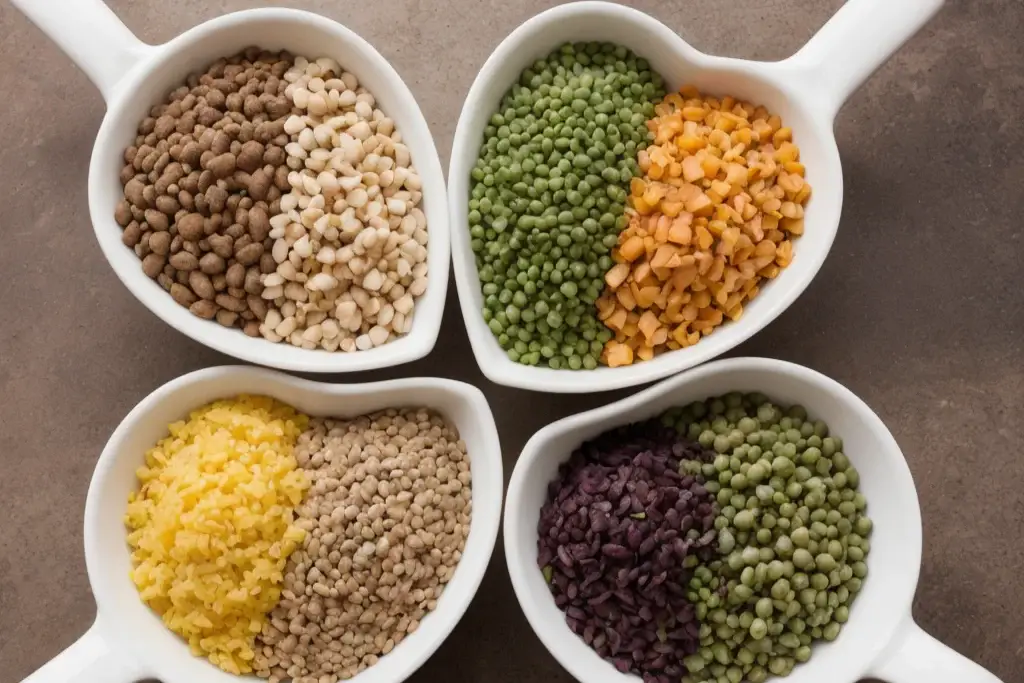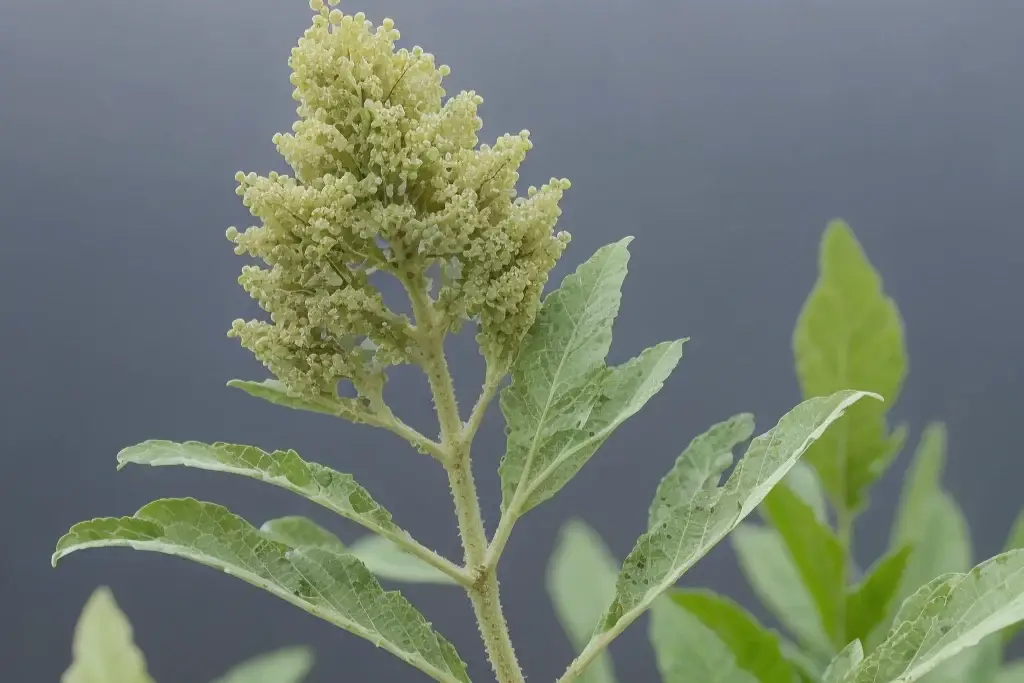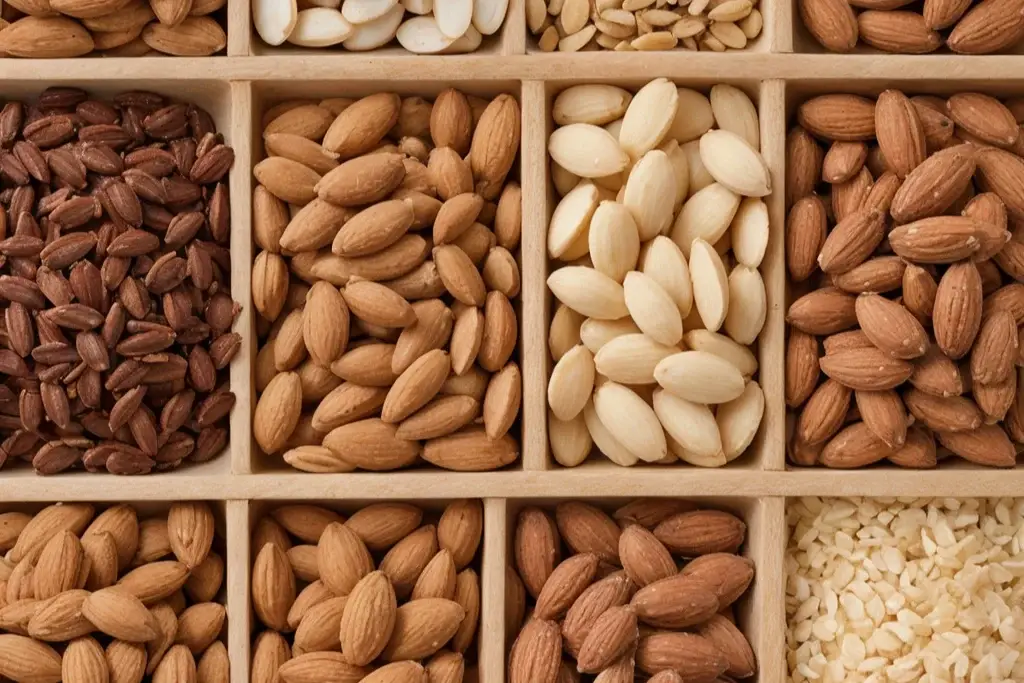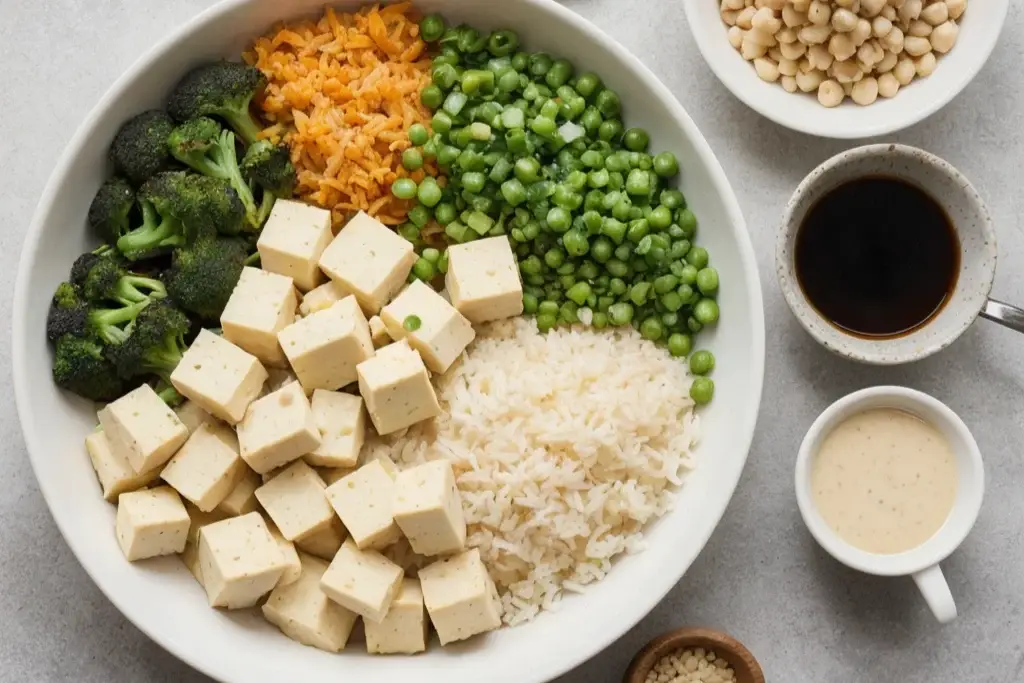In the quest for a balanced and nutritious diet, protein plays a crucial role in supporting overall health and well-being. While many people associate protein with meat and animal products, there is a wealth of vegetarian protein sources that provide essential nutrients without the need for animal products. At WellHealthOrganic.com, we’re passionate about promoting plant-based nutrition and empowering individuals to make informed choices for their health. In this comprehensive guide, we’ll explore a variety of vegetarian protein sources to help you meet your nutritional needs and thrive on a plant-based diet.
1. Legumes: Nutrient-Rich Powerhouses
- Legumes, including beans, lentils, and chickpeas, are nutrient-rich powerhouses packed with protein, fiber, vitamins, and minerals. These versatile plant foods can be incorporated into a wide range of dishes, from soups and stews to salads and curries.
- Black beans, kidney beans, and pinto beans are excellent sources of protein, with around 15 grams of protein per cooked cup. Lentils and chickpeas are also high in protein, providing approximately 18 grams of protein per cooked cup.
2. Quinoa: The Complete Protein
- Quinoa is a unique plant-based protein source that stands out for its complete amino acid profile, making it an excellent choice for vegetarians and vegans. In addition to protein, quinoa is rich in fiber, iron, magnesium, and antioxidants.
- One cup of cooked quinoa contains approximately 8 grams of protein, making it a satisfying and nutritious addition to salads, stir-fries, and grain bowls.
3. Tofu and Tempeh: Soy-Based Superfoods
- Tofu and tempeh are soy-based superfoods that are prized for their high protein content and versatility in cooking. Tofu, made from soybean curds, is a staple in Asian cuisine and can be grilled, sautéed, or blended into smoothies for added protein.
- Tempeh is a fermented soy product that offers a nutty flavor and firm texture. With around 20 grams of protein per 3-ounce serving, tempeh is an excellent meat alternative for sandwiches, stir-fries, and salads.
4. Nuts and Seeds: Portable Protein Powerhouses
- Nuts and seeds are portable protein powerhouses that provide a convenient snack option for busy lifestyles. Almonds, peanuts, and cashews are rich in protein, healthy fats, and fiber, making them a satisfying and nutritious choice for on-the-go snacking.
- Additionally, seeds such as chia seeds, flaxseeds, and hemp seeds are packed with protein and essential nutrients. Sprinkle seeds onto salads, yogurt, or oatmeal for an added boost of plant-based protein.
5. Dairy Alternatives: Plant-Based Protein Options
- Dairy alternatives such as almond milk, soy milk, and oat milk are fortified with protein and other nutrients to provide a plant-based alternative to cow’s milk. These dairy-free options can be used in cooking, baking, or enjoyed on their own as a beverage.
- Greek yogurt made from almond milk or coconut milk is another excellent source of plant-based protein, with around 10 grams of protein per serving. Enjoy it as a creamy topping for fruit or granola, or use it as a base for smoothies and parfaits.
How much protein can the Human need and what requirements?
Protein is a building block in the human body and plays a typical role in the repair of tissues & muscles.“It’s essential to make muscles and tendons and skin tissues, and it helps your body produce antibodies to fight infections and improve the healthy adults should get about 0.36 grams of protein per pound of their body weight each day. That equals about 54 grams for an adult weighing 150 pounds. As per common perception, globally animal protein is consumed globally. However, in recent years it has seen disadvantages in many forms. This is why awareness related to vegetable protein has been multi-folded. In countries like India consuming vegetable protein has gone on a large scale.
High-protein vegetables and seeds can provide a good source of protein.
High-Protein Vegan Diet to focus on the foods
- Nuts: These are the best food for maintaining good health and the amount of protein for every 100 grams, but there are also a lot of calories from fat. They are a great snack food to take around, or you can mix in nut butter like peanut butter with something like a smoothie.
- Legumes: The most balanced vegan protein source in terms of protein and calorie density. Dry beans are far cheaper and anyone can purchase them easily, and most vegans consider them to be a must-have. Their high fiber and water content causes them to rank not well on the lists above. Soy-based products, such as tempeh, tofu, and soy milk, are the best bean products that provide protein.
- Beans: Each kind of bean can provide 6 to 9 grams of protein and 6 to 8 grams of fiber to help you feel full in just half a cup. Beans may also support good gut flora and reduce cholesterol.
- Grains: You probably think of grains as primarily carbohydrates, but they also pack a protein punch. For example, for your morning meals, half a cup of oats offers five grams of protein, while a quarter cup of fresh barley or grain adds five to six grams. Teff, millet, amaranth, and other ancient grains are also great options to mix up your meals.
- Green peas: Green peas are like many people to many other healthy nutrients like fiber, vitamin K, and vitamin A, green peas also contain carbohydrates and protein while they get a bad rapping, peas are a fantastic source of protein: Cooked peas contain eight grams per cup.
- Plant-based eats: Plants can be provided Dairy milk and pea milk, a substitute for milk, contains almost as much protein as cow’s milk. Find varieties that are such as casually flavored or without sugar.
- Nutritional yeast: The secret ingredient in many vegan “cheese” sauces, nutritional yeast is a great source of protein and B vitamins. One tablespoon sprinkled on top of your meal adds two grams of protein.
- Vegetables: They’re not the most abundant sources of protein, but if you’re eating a diet heavy on vegetables, you’ll get a decent amount of protein from them. For example, a cup of cooked Brussels sprouts contributes 4 grams of protein to your meal. these ingredients can be used Five grams make up a cup of sweet yellow maize Low in calories but high in protein per calorie are leafy greens such as bok choy, spinach, and watercress.
- Meat substitutes: For any meat lovers, faux meat products can ease the switch to a plant-based diet, but not all of them are good for you. Choose items with few ingredients, lots of protein, and a healthy amount of sodium and saturated fats.
- Eggs or egg whites: The egg is the best part of the protein and they are the cheapest cost they can purchase easily and nutritious source of proteins. Each egg provides 6 to 8 grams. If you eat white eggs, you are not getting as many calories, but you won’t get the B vitamins, omega-3 fatty acids, and vitamin D that are contained in the yolk.
- Dairy products: Dairy Products are the best source of the product. These are the making in many things like butter, milk, cheese, and curd, these are excellent sources of protein and calcium. To get the most protein in dairy products can be manipulated by plain Greek yogurt. Every serving of these contains dairy products at least 13 grams of protein, and they can be attired up for a hearty breakfast or snack by including fruit, nuts, or granola.
- Seed: Like nuts, seeds are a great source of protein and unsaturated fats. These are the Select pumpkin seeds, which have 7 grams of protein per ounce, and sunflower seeds, which have 8 grams each ounce, as a snack. You can also sprinkle hemp seeds, which have about 10 grams per ounce, on your morning oatmeal or toast.
- Peanuts: Peanuts have 25.8 grams of protein per 100 grams. Peanuts are the best foods for vegan bodybuilders and these do not technically work Peanut butter can be performed easier to add to a variety of other foods, and peanuts themselves taste delicious.
- Almonds: Almonds contain 21.1 grams of protein per 100 grams, and almond milk also contains quite a bit. The biggest downside of using nuts as a protein source is that they contain a lot of calories and omega-6 fats. They should generally limit how much eat almonds and the ratio can eat on the omega 3 to 6 fat ratio of nuts for more data.
- Flaxseed: Rounding out our elite 8 is flaxseed with 18.3 grams of protein per 100 grams. Similar to seeds like flax, flax is one of the best vegan sources of omega-3 fats and an excellent source of many vitamins and minerals. The majority of people should eat as much of this tasty food as they can. Add it to salads, smoothies, oatmeal, and even baked items as a “vegan egg.”
- Pumpkin Seeds: Pumpkin seeds have 18.5 grams of protein per 100 grams and the seeds are beneficial in health these can be not only good sources of protein but minerals like magnesium, zinc, and copper as well as are good for health. Similar to nuts, the omega 3 to 6 fat ratio of seeds (avoid sunflower seeds in particular) isn’t always great.
These are Other nutritional considerations used for vegetarians and vegans:
- Vitamin B12.
- Calcium.
- Iron.
- Zinc.
- Vitamin D.
- Omega-3 fatty acids.
Chickpea nutrition facts
Chickpeas are rich in fiber and protein. They contain several key vitamins and minerals. Importance nutrition can be used and provided the benefits of chickpeas may include and get helping reduce the risk of type 2 diabetes and supporting brain and nervous system function.
- 14.5g protein
- 269 calories
- 4.25g fat
- 44.9g carbohydrates
- 12.5g fiber
Peanut butter nutrition facts
Peanut butter is high in fat and calories. Just 2 tablespoons deliver a quarter of your recommended daily intake of fat, some of it saturated. Moreover, peanuts are one of the eight most common food allergens in the United States, affecting 1.4% of the population (or roughly 4.6 million people).
- 7g protein
- 190 calories
- 16g fat
- 7g carbohydrates
- 2g fiber
Lentils nutrition facts
Divide many parts of protein sources like red lentils, orange, red, yellow, and black lentils are among the other lentil types. Given their powerful nutritional profile, lengthy shelf life, and ease of preparation, lentils are a wise and healthful part of any diet.
- 17.9g protein
- 230 calories
- 0.75g fat
- 39.8g carbohydrates
- 15.6g fiber
Edamame nutrition facts
In addition, research shows that consuming soy protein might help to lower your cholesterol and even reduce the risk of certain cancers. Green soybeans called edamame are commonly served in their beans with an equal amount of sea salt. Additionally to being an excellent source of plant-based protein, these beans are also a good source of fiber, important vitamins, and minerals.
- 18.4g protein
- 188 calories
- 8g fat
- 13.8g carbohydrates
- 8g fiber
Tofu nutrition facts
Also known as bean curd, tofu is made from soybeans and provides a wide range of health benefits. When you include tofu in your diet, it can provide a quality source of protein, benefit your heart, and support strong bones. The list of vegan protein sources wouldn’t be complete without tofu. Plus, it’s time to end the stigma that tofu is bland.
- 21.8g protein
- 181 calories
- 11g fat
- 3.5g carbohydrates
- 2.9g fiber
Oats nutrition facts
Oats are a good source of many vitamins, minerals, and unique plant compounds. These are famous in grain and also offer several potential health benefits, including reduced cholesterol improved insulin sensitivity, and tasty dishes with milk.
- 6g protein
- 166 calories
- 3.56g fat
- 28.1g carbohydrates
- 4g fiber
Walnuts nutrition facts
In these are addition to being nutritious and a filling and tasty food, walnuts can be added to a broad range of recipes, including savory and sweet treats. Walnuts are an excellent source of polyunsaturated fat—a healthy fat that can boost heart health and provide other benefits.
- 220 calories
- 22g fat
- 5g carbohydrates
- 2g fiber
- 5g protein
Almonds nutrition facts
Almonds are also highly versatile. Almonds are a low-fat, high-nutrient food that can be eaten either raw or cooked. They are also lightweight. You can buy raw, roasted, salted, or without-salt almonds. The almond can be turned into almond butter, almond milk, or ground to make an almond meal.
- 6g protein
- 170 calories
- 15g fat
- 6g carbohydrates
- 4g fiber
Flax seeds nutrition facts
Flaxseed—also commonly referred to as flax seed or linseed—can be a nutritious addition to your diet. The little brown or golden seeds are high in fatty acids and fiber, both of which are heart-healthy. They can be eaten whole or used to make flaxseed oil, extracts, flour, and food products like salad dressing. Flaxseed has been famous for thousands of years in the whole world.
- 5g protein
- 160 calories
- 9g carbohydrates
- 12g fat
- 8g fiber
Soybeans nutrition facts
Soybeans are the best nutrition facts Because they are high in protein and healthy, soybeans have an extensive number of nutritional uses. People can eat them, drink them in milk alternatives, and take them in the form of supplements.
- 31.3g protein
- 401 calories
- 14.4g carbohydrates
- 27.5g fat
- 10.4g fiber
Peas nutrition facts
Green peas are a popular vegetable. Also, they are equally full of nutrients and have quite a bit of antioxidants and fiber.
- 70 calories
- 12g carbohydrates
- 0g fat
- 5g fiber
- 4g protein
Common Vegetarian Protein Sources In Indian Households
1. Legumes: Beans, Lentils, and Peas

Legumes are a powerhouse of protein, fiber, and various nutrients.
Research published in the Journal of the Academy of Nutrition and Dietetics highlights legumes as not only a rich source of protein but also beneficial for our heart health and diabetes prevention.
Nutritional Profile of Common Indian Legumes: Vegetarian Protein Sources
| Item | Protein Content (per 100g) | Calories (per 100g) | Fiber Content (per 100g) | Important Micronutrient |
|---|---|---|---|---|
| Kidney Beans | 8.9g | 127 | 6.4g | Folate |
| Black Gram | 25g | 341 | 4.8g | Iron |
| Green Peas | 5g | 81 | 5.1g | Vitamin C |
| Chickpeas | 19g | 364 | 17g | Iron |
| Mung Beans | 24g | 347 | 16.3g | Folate |
| Red Lentils | 26g | 116 | 7.9g | Folate |
| Soybeans | 36g | 446 | 9.3g | Iron |
2. Quinoa: The Complete Protein

Unlike many plant proteins, quinoa seeds are considered a complete protein, containing all nine essential amino acids.
A study in the Journal of Current Opinion in Food Science points out quinoa’s protein quality and its role in improving the nutritional content of a vegetarian diet.
Nutritional Content of Quinoa: Vegetarian Protein Sources
| Nutrient | Amount per 100g |
|---|---|
| Protein | 4.4g |
| Calories | 120 |
| Fiber | 2.8g |
| Magnesium | 64mg |
| Iron | 1.5mg |
| Calcium | 17 mg |
3. Nuts and Seeds: Compact Nutrient Dynamos

Nuts and seeds are not only protein-rich but also provide healthy fats, vitamins, and minerals. Almonds, for example, offer around 6 grams of protein per ounce.
The Americal diabetes association notes that incorporating nuts into your diet can lower the risk of cardiovascular disease.
Nutritional and Health Benefits of Common Nuts and Seeds: Vegetarian Protein Sources
| Nut/Seed Type | Protein Content per 100g | Health Benefits |
|---|---|---|
| Almonds | 21.4g | High in Vitamin E, reduces heart disease risk |
| Walnuts | 14.6g | Rich in Omega-3, supports brain health |
| Pistachios | 20.5g | Lowers LDL cholesterol, good for heart health |
| Cashews | 17.4g | Magnesium-rich supports heart and liver health |
| Flaxseeds | 18g | High in Omega-3 fatty acids, anti-inflammatory |
| Pumpkin Seeds | 30g | Magnesium-rich, supports heart and liver health |
| Chia Seeds | 17g | High in fiber, promotes weight management |
4. Soy Products: Tofu, Tempeh, and Edamame

Soy products are versatile, high in protein, and can be great meat substitutes. Tofu, for instance, packs about 10 grams of protein per half-cup serving.
A report published in the American Journal of Clinical Nutrition supports soy’s role in a healthy vegetarian diet, emphasizing its nutritional benefits and versatility.
Wellhealthorganic Vegetarian Protein Sources:
Nutritional Profile and Benefits of Common Soy Products: Vegetarian Protein Sources
| Soy Product | Protein Content per 100g | Calories per 100g | Key Nutrients | Dietary Benefits |
|---|---|---|---|---|
| Tofu | 17g | 144 | High in calcium and iron | Supports bone health, good for heart health |
| Tempeh | 20g | 192 | Rich in protein and fiber | Aids digestive health, beneficial for muscle growth |
| Edamame | 12g | 121 | High in fiber, vitamin K, folate | Lowers cholesterol, may help in blood pressure management |
Conclusion: Embracing Plant-Based Protein for Optimal Health
In conclusion, vegetarian protein sources offer a diverse array of options to support a balanced and nutritious diet. From legumes and quinoa to tofu and nuts, plant-based foods provide essential nutrients while promoting health and well-being. By incorporating these vegetarian protein sources into your meals and snacks, you can enjoy delicious, satisfying food while nourishing your body with the nutrients it needs to thrive. With WellHealthOrganic.com as your guide, you’ll discover the endless possibilities of plant-based nutrition and embark on a journey towards optimal health and vitality.

